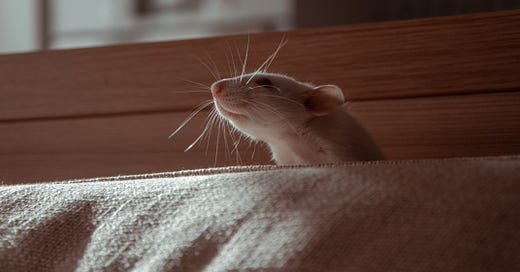Every summer when tomatoes, eggplants, zucchini, and bell peppers are at their peak, I make ratatouille. It’s a wonderfully rustic stew, perfumed with basil and enriched with good olive oil. I like this recipe. After making the dish last week, my family—recently outfitted with a Disney+ subscription—decided a viewing of the 2007 Pixar animated film Ratatouille was in order as well.

Ratatouille is about a rat, Remy, who dreams of becoming a chef. Early in the film, he sneaks into an old lady’s house near his rat colony to watch cooking shows, where he sees celebrity chef Gasteau. On this viewing, I was inspired by Chef Gasteau’s advice for how to create something great:
“You must be imaginative and strong-hearted. You must be willing to try things that might not work. Your only limit is your soul. Only the fearless can be great.”
Good advice for all creative endeavors.
Remy eventually finds himself secretly helping an apprentice cook in a Paris restaurant. The restaurant staff are terrified when food critic, Anton Ego, comes to review the restaurant. Ego is dubbed “the Grim Eater.” He’s depicted as a miserable and menacing snob, slightly hunch-backed, always sneering with dark circles under his eyes. His office is shaped like a coffin. His typewriter looks like a skull. He’s terrifying.
Ego-what a brilliant name for a critic! If you’ve every tried to make anything creative, I’m sure you’ve experienced the dreaded inner critic. It’s that ego-driven voice that tells you everything you try to do is terrible, everyone else has already done it, and you’ll never be any good.
For me, ego, if not kept in check, is detrimental to my creative practice. The ego as Freud original conceived it is the part of our personalities that operates under social realities and norms. It’s the “what will people think?” part of our psyche. It’s also what’s drives us to present our best self to the world and to be ambitious. But let ego run unchecked, and it becomes self-centered, driven to seek praise and fame, and it gags the authentic part of our soul that must be unafraid of other people’s reactions if we’re to produce our most meaningful work. To produce great work, we must be willing to try things that might fail. We must try again after they do fail. My ego works hard trying to stop me from creating out of fear of failure.
One thing that has worked for me to manage my ego is meditation. (There are other practical ways to silence your inner critic.) When I sit in silence and focus on my breath, my ego tries to break in with incessant judgement and second guessing. When I meditate, I’m trying to shut this voice up and listen to my True Self. As Richard Rohr explains in Falling Upward, your True Self is “who you were before you did anything right or wrong, or made any decisions good or ill. It’s your Absolute Identity, your Anchored Self, which can be neither gained nor lost by any technique, group affiliation, morality or formula whatsoever.” Meaningful creative work flows from this True Self. Fearlessly.
As for how Remy conquers Anton Ego? He decides to serve Ego ratatouille, which shocks the other chefs because it’s such a humble peasant dish—the last thing you’d expect to impress a dour, pretentious critic. *Spoiler Alert* Ego takes one bite of ratatouille, and he’s immediately transported to a childhood memory of his mother making ratatouille for him, out of pure love. He writes a glowing review. Often times, our ego just needs to be shown that we are lovable. Just as we are. By the end of the film, Anton Ego, has become Chef Remy’s greatest supporter.

What does this mean for creativity? Know that your creative work has value because you’re uniquely you (with a complex mix of insights and experiences), and no one could create it but you. That is nothing short of miracle. Who cares if what you’re producing is humble like ratatouille? It’s lovely, and it’s yours.
—Sarah
Founder of Writers’ Studio
P.S. Are you a writer looking to hone your craft? Writers’ Studio is offering a free Zoom class, Saturday August 8th at 3 pm, called The Slide and The Summary: Transitioning within Scenes. Follow this link for more information or to sign up.



